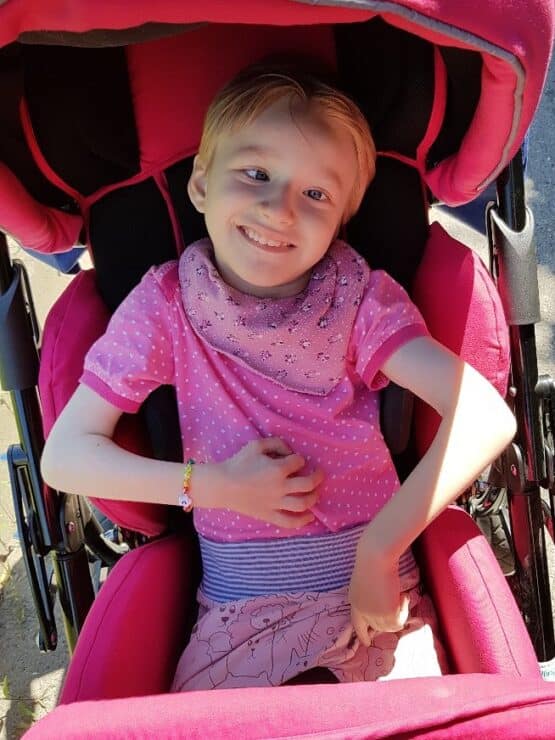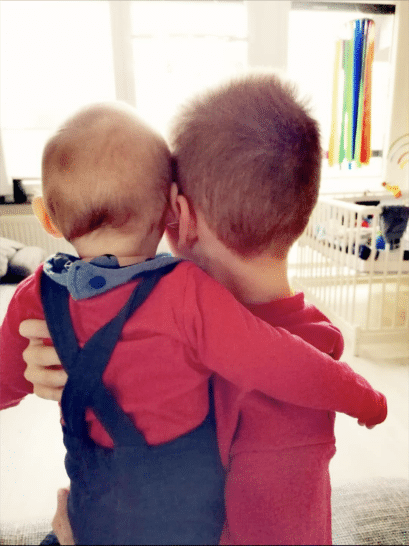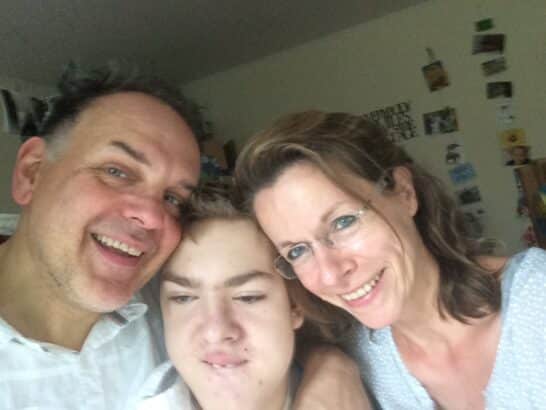“Be strong for your child, because if you are not, no one will be”
In this interview, Judith talks about her older daughter Lotti, who passed away shortly before her 7th birthday. We hear about the shock of the diagnosis and her fighting for her little baby, who simply wasn’t gaining weight and suffered from pain. She talks about the support she received from the PCH family and what it really means to put yourself second; what it takes to intuitively know the needs of your child and how to find the courage and strength to be there for them.
Who is in your family?
This is us parents, Judith and Alex, with our three children Charlotte a.k.a. Lotti, Daisy (6) and Theddy (4); as they call/called each other.
How did your PCH2 journey start?
During pregnancy, I found the movements of my baby strange in all the amniotic fluid, but as a first-time mother I was reassured that everything was perfectly normal.
Immediately after birth, nursing was difficult and a thermoregulatory disorder developed, but these were considered ‘normal’ adjustment difficulties. Lotti cried intensely and piercingly, as if in drug withdrawal, and seemed to be in pain. She would vomit up to 20 times a day.
In our distress, we took her to the hospital and asked for acid blockers, painkillers or perhaps Motilium, but they refused, only suggesting a PEG tube or, later on, a fundoplication, which we rejected.
At the age of 11 months, we approached a second clinic, where we found all the support we could wish for, as well as full medication (painkillers, acid blockers, Motilium) and a diagnosis. In a short time, Lotti’s food intake multiplied and she also got as much help as possible under these circumstances.
What symptoms did Lotti have? Did they change over time?
Lotti could swallow well, but very slowly. Feeding took 10-14 hours a day; initially only mum, later both mum and dad could do it.
One of the hardest things was the terrible pain in her digestive system.
Strangely enough, the epilepsy hardly affected Lotti at all. And at some point, it suddenly stopped and disappeared virtually overnight.
Around the same time, Lotti stopped using the few words she had learnt. Not only was it painful to no longer hear her say Mömö (Mama), but… somehow we had a feeling that this was not a good sign.
The thermoregulatory disorder posed major challenges for us. At first we had to keep one room heated to 37°C (99°F) and she was even wearing a snowsuit there all day.
At the same time, she had repeated attacks of severe fever, during which we had to cool her down with wet cloths. These were mostly periods where her oxygen saturation was poor despite normal breathing.
Which symptoms did you consider the most difficult for you and Lotti?
The pain. It was hell. At times Lotti would scream for weeks or months until she fainted. She would lose consciousness for 20 minutes, wake up and start all over again.
What helped you to manage your daily life as a family? Where did you get support?
The self-help group PCH Familie was and is immensely valuable to us.
We all understand each other. Often without words. A quick glance, a smile, a nod is all it needs. In the same way, we can also talk for hours on end. It is an indescribable feeling and the greatest relief to be able to share experiences with each other – when we have all been overwhelmed by something that has changed everything for us. And when you think you can’t go on – suddenly there are people who feel the same way. And together you realize that you will manage. That connects us – and amazingly, right from the first contact. It often feels like we’ve always known each other. This quickly leads to new friendships and close bonds (while old friendships fade due to the changed circumstances). We are part of a reliable network of exceptionally committed families. It’s like a picture-book family – if only you could have that family without the condition!
You are the parents of a PCH Angel. How did you spend the last weeks/ days with your child? How did you say goodbye to them? What gave you strength afterwards?
Strangely enough, we didn’t realize that our time with Lotti was coming to an end. She wasn’t doing well. But of course, due to her condition, this was not something remarkable, but normality.
Then came that one evening when she finally seemed to be getting better. We were relieved, albeit shocked at how much weight Lotti seemed to have lost within hours. Grateful for the sudden relief from pain, we began to treat her to some food.
I (mom) was heavily pregnant, with the unusually relaxed Lotti sitting on my lap – and she smiled and stroked my belly. Suddenly, for the first time in her life, she had enough control over her hands to play with her unborn sibling inside my belly.
Later, she fell asleep on Dad’s arm while he watched a TV program.
I checked on Lotti every now and then to make sure she was still tucked up warm enough in her blanket or if there was anything else I could do for her.
Then I suddenly realized… that she was no longer breathing.
She had simply dozed off and it was over. On the best day she’d had in a very long time.
Why was and is Lotti someone really special?
Considering how many sick children there are, our daughter is of course not that special. And at the same time, every other child out there is someone special.
However, there is something that separates our first-born, sick daughter from our two other children:
Before she was born, we were unaware that something like PCH existed. It is so much more serious than anything we could have ever imagined. We didn’t know that everyone carries the risk of having a child with a serious disease out of the blue. And so we were completely unaware that this risk would become a reality for us. It was different before the birth of our other children. Now we had experienced what we humans have inside us. This gave us a completely new perspective on the miracle of their good health.
We owe this sense of appreciation to our first daughter. Without her, we wouldn’t have any idea how special our two healthy children are and how grateful we should be for all three of them.
What advice would you like to give to the parents of a child who has just been diagnosed with PCH2?
It is a shock. Everyone in the PCH community knows it. You think of the child and all the things they can’t do/have in life. You think of your family and how disappointed they may feel. You look at who is to blame, but is there really anyone? You also think of yourself, because your child won’t come running up to you saying “Mamaaaa” or “Papaaaa” when you walk in the door – and you won’t have any grandchildren…
Am I supposed to give up my private/professional life now to look after this (my) child? How is all of this supposed to work?
But once you have gone through these feelings, try for a moment to stand aside. Forget yourself and others. Let yourself ask the question: What if… What if I had PCH? What would I wish for? What would be important?
Everybody only has one life. It is the most precious thing we have, because there will not be another one. And this is your child’s life. Just as it is now…
Make the best of it. For your child and yourself, right here and now. Your child’s life is what you choose to give them now. And now it’s also your life. Your memories will be made from it.
As you look at the child in your arms, you intuitively know what to do.
Your child looks cold; dress them up warmly even in summer!
Your child seems to have a permanent fever; wear short-sleeved bodysuits in winter!
It’s not sleeping? At some point it will have to. And if it only sleeps in bed with you, then so be it!
Your child wants to be in your arms all day? Who wouldn’t want that?
It doesn’t matter what used to be normal or what others might say: This is your child. You are the one who knows what it needs and what your job is as a parent – and you realize that you can do it.
Take pictures. Loads of pictures. Cast footprints.
Helpful Thoughts
As long as there is no emergency situation, you have time to think. Think as long as you need.
Try acid blockers for unexplained restlessness and ambiguous pain. Consider high doses.
There are no ready-made solutions, as we don’t have regular-people problems. It’s okay to try things out and sometimes say no to offers.
Trust and listen to your intuition and experience.
You have to be able to justify your decisions to yourself, so you have the right to decide.
Don’t compare your child and yourself to others!
There is always a way forward. Sounds clichéd, but it really is true. There is always a way forward. Always.
“Be strong for your child, because if you are not, no one will be.”
(Judith, mother of Lotti)
Share Your Own Story
to support and encourage other families on their journey.


